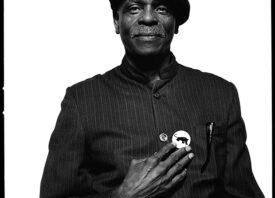Search this site
A Look at New York’s Couchsurfing Community, in Portraits


Natcha Wongchanglaw spend a few weeks on the Couchsurfing app before the first person agreed to be photographed as part of her series of portraits. He gave her his address, and she showed up that night in Harlem. A traveler from Germany was there and cooked them dinner, which they ate together as they chatted about the couchsurfing experience.
The idea behind Couchsurfing is simple: it’s a social network that connects local hosts with travelers from around the world. The travelers stay with the hosts for free, and in exchange, the hosts learn about different cultures and connect with new people.
Anyone can sign up and make a profile sharing their interests. Users then get references from other users who’ve met and stayed with them, building trust in the process. In cities with a large couchsurfing presence, such as New York, there are also in-person meetups and events for members of the community.
Wongchanglaw moved to New York in 2019 and embarked on her portrait series Couchsurfing Hosts while studying with Marko Kovacevic and James Estrin. She read profiles and references carefully, starting with hosts who had more than 200 references and then broadening the search as she went. “I remember being afraid to send a request at first because I had no references,” the photographer tells me. “But I did it anyway.”
She was straightforward about her goals for the project. Most people didn’t respond, but some did, and then more followed. “I consider myself to be fairly open-minded,” Wongchanglaw says. “Some people have told me that despite the fact that we have only just met, they feel strangely at ease around me and are comfortable enough to tell me their stories.”
And these people had stories: at one point, one host even got a surfer out of jail. Wongchanglaw also learned that the community had come together in the wake of Hurricane Sandy, when people lost their homes and opened their doors to one another. She was especially moved after hearing about a host who’d helped a surfer get out of an arranged marriage and pursue a new life.
Wongchanglaw stayed the night with some hosts, but in many cases, she visited for a few hours, sharing a meal and creating the portraits. She brought just her camera, a speedlight, and a diffuser to each shoot. She came in whatever clothing she was wearing at the time, and the hosts did the same.
The first location—and one Wongchanglaw always photographed as part of her couchsurfing portraits—was the spot where travelers stayed, usually on a couch in a living room. She might direct a host just a bit, guiding them slightly to the left or right, but she didn’t pose them. She set up her lights, took some test shots, and then hopped into the frame herself. It was important for her to sit next to the hosts to show the relationship and level of comfort they built with one another.
The photographer did not stage the interiors, so they accurately reflect the eclectic styles of the hosts and their everyday lives, featuring everything from American flags to lush garden patios to beer pong tables. What connected each sitter was a sense of openness and curiosity about other people and their perspectives. Wongchanglaw was also struck by their willingness to meet and connect with people face-to-face, particularly at a time when socializing increasingly takes place online and through a screen.
When asked whether she considers herself an insider or outsider in the couchsurfing community, Wongchanglaw says she’s probably somewhere in between. She thinks that someday she might become a host herself (she has roommates now, so it’s not feasible), and she plans to do some couchsurfing on future adventures around the world. Most of all, she’s made friends: the artist stays in touch with most of the hosts she met along the way, and one of them even became her roommate for a year.







All images © Natcha Wongchanglaw
Interested in seeing more couchsurfing portraits? Check out this project by Gabriele Galimberti.

